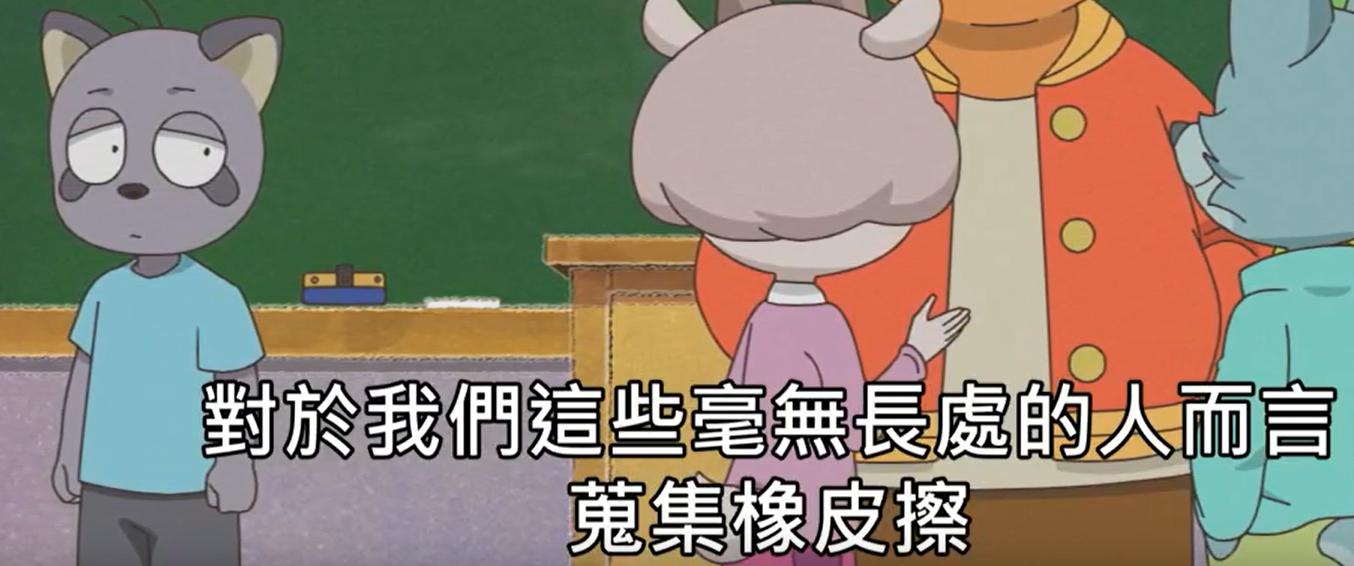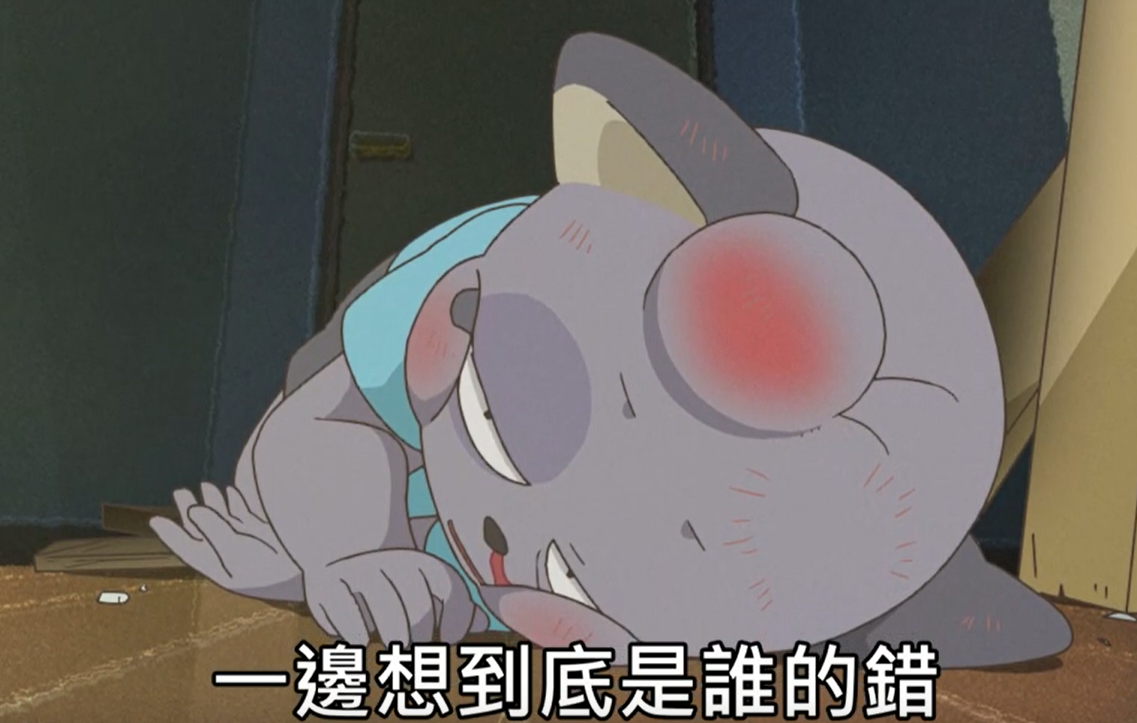【Miscellaneous】What are we talking about when we talk about the Big Other?
As subjects of speech, we were born in language, and we have long thrown ourselves into the ocean of the Other
When I stuffed a mouth ball that lasted a day for the group friends who said weird things in the group
I actually wanted to say - "It's cool, I played the big other"
So the question is, what is the big Other?
Imagine a scenario: We're a bunch of little brats, and we set a game rule for each other on our boring days, we can only move in the shadows, carefully avoiding the sun, so we start a game that may be awkward in other people's eyes Brilliant action - this set of rules did not exist before, but it tied our hands and feet. The rule is the Big Other
Let's pull out the scene from the fourth episode of "KitKat Taxi", taking the role of Tanaka as an example:
We might as well start by throwing an assertion: Tanaka has always moved under the Big Other of his own making and never left its conditioning .
Or that Tanaka has been being "fought by proxy", I don't see Tanaka's free will.
From the activity of collecting erasers in Tanaka's third grade in the same year, Tanaka's environment has two opposing symbolic orders: "no gap between rich and poor maintained by the teacher" and "the grade of the elderly." "Pyramid", Tanaka under the two is contradictory. He is unwilling to admit the teacher's idea, and is unable to enter the latter's order, so he can only play the game of "holding rare erasers " with Sato on his own. - This has become a source of Tanaka's self-affirmation, morbidly believing that this set of rules exists and always calculates its own value - although these rules are unwritten, virtual, temporary, and fragile, it is obvious that this will not We may have to question whether it is acknowledged by the teacher or the person standing at the top of the pyramid in the class, and even whether Sato really realizes that there is such a person named "Tanaka" competing with him. However, when Tanaka believes that it exists, it has absolute power to dominate Tanaka's behavior - this is Tanaka's Big Other.


We might as well think that this is the big other that belongs to Tanaka. That small group of people always gathers around Sato. Tanaka can't "conquer" Sato with a dodo rubber or toast, but this is determined by the rarity of the rubber. The game of decision can also continue to be played until it self-destructs - in the process, the role of the Big Other is to attribute everything to "there is no more rarer eraser", thus entering a loop, and the premise It was Tanaka who had always believed in the Big Other—“Did Tanaka really reflect on himself?”
The answer is no, so the game of the Other goes on, and Tanaka enjoys the rare eraser unconsciously until his father comes in—we can think of the father as a more powerful symbolic order that can easily The toy that Tanaka made up for himself is smashed by the big Other - physical exhortation to Tanaka (well said! I'm going to lift the copper-headed belt and make you spin like a top!), or until this The Big Other exposes a fictitious, fragile moment: the auction rubber is not delivered, and the symbolic order collapses.


^The traumatic moment arrives^
Back to the title of the episode itself - "Tanaka Revolution"
The collapse of the Tanaka revolution is the collapse of the Other
The absurdity of Tanaka's revolution is the absurdity brought about by giving absolute power to the fictional Big Other.
And the latter part is just the transfer of Tanaka's big Other. Tanaka aims to break away from another order and enter another symbolic order (desperate to save the past self, but this is essentially a traumatic enjoyment,)—— "Wildlife Garden".

But the result is still the same, Tanaka in the past has become "ditch-11", and the rubber chasing has become "dodo bird". In the same process, Tanaka gradually lost his free will and became a marionette of the Big Other. , Desire continues to reproduce, but if there is no accident of Otogawa... But this is another story, maybe it will be the content of another chapter (will there be?)
Back to the question about the big Other, let's take a twist:
The Big Other is the symbolic order, the unwritten construction of society, the second nature of every speaking being: it is here to guide and control my actions; it is the ocean in which I swim, but ultimately impenetrable— -I cannot put it before me and understand it" - How to Read Lacan
In the analysis of various works, we can try to find the unspeakable part behind all actions—the symbolic order for which the protagonist acts—we are playing such a game with the “big other”. .
I'm cool because the whistleblower knows that I'm abusing him, that I'm acting as the "Other" - I know so well and I'm obsessed with the overlapping of the eyes of the Big Other, who I consider myself to be The enjoyment is "cool", the Big Other replaces my enjoyment, just like the canned laughter in a TV comedy, it replaces my laughter; Above, or coincident with the protagonist's line of sight, the boundaries between our subjects disappear, we play the big Other, and experience almost lewd pleasures.
Or take someone's gibberish in a slightly drunk state as a chestnut (the ta is between you and me, I don't say who ta is)
One of the effects that a drunken state may have is what does it replace by turning a blind eye to the Other? A lascivious hedonistic nothingness? - but being interrupted by this thought and spinning in an unconscious loop and self-defining a "awake dimension" - look I'm awake
Probably drunk but saying that he is not drunk is like this, and this kind of inexplicable "sense of freedom" and the confusion of speech in this slightly drunk state can be explained as the broken period of the big Other.
Or take the novice guide of the game as an example, you need to abide by the rules of the game, according to a given route or process, when you play Dark Souls, Mr. Guda cannot escape this lesson - the game can continue. This rule, or the thing that ensures the existence of all order - at least you believe so - is the Big Other.
Of course you can smash the keyboard and don't play this game, yes, I don't play anymore, I was persuaded to quit by Guda, this game is too difficult, I think the rules and order are like shit, and instead give up the enjoyment here, this The Big Other of time is fragile, yes, we do not have to act according to it, our free will is not bound by it, our perception of ourselves as autonomous and free agents is not an illusion of the user, we are not hidden A tool in the hands of the Other who is manipulating the strings behind the scenes - we are free from this nihilistic inducement
Although the Big Other has fundamental power, it is fragile, incorporeal, and completely virtual in the sense that its state is a state assumed by the subject. The subject exists only when it acts as if it exists - How to Read Lacan
But to be honest, in actual life, we may not call the "big other" directly. It may not be called this name. In another context, it can be sewn into the depths that we cannot see, and it may refer to other places. It'll be different, but we do refer to it by the name "The Big Other" - and honestly, it's a weird name too - and when we attach all the value to this thing, it sucks , it is also easy to fall into the vulgar nihilism
However, don't be fooled by the concept of the "big other".
——But if there are any signs, you can read more about this passage in "Introduction to Lacan"
When reading Lacan's problems, we all have a kind of paranoid misunderstanding of knowledge. For example, we try to look at the people and things around us from the perspective of Lacan's theory, delusion that everything can be explained through Lacan's theory. , or to flaunt one's own wisdom and even achieve one's own unique existence with the difficulty of Lacan's thought, to be alienated by Lacan's theoretical language and to enjoy himself without knowing it, and finally to be transformed into what we usually call a "patient" in the sense of psychoanalysis. " Only the psychoanalyst dares to admit that he is the remnant of the symptomatic production of the "patient", because it is the remnants of this symptom that open up to us a dimension of unconscious enjoyment in addition to physical and mental pain - this Lacanian term "Saint" and once we are caught up in the desires of Lacan, the Other, in the field of psychoanalytic exploration, then following his teaching - "don't give in to your own desires" - we are bound to follow Follow the desire of the big Other to question our own desires, so as to gradually get rid of the influence of the big Other on us in the game and struggle of the dialectics of desires, and finally find a world that belongs to us. Pay off the token debt we owe to the Greater Other.
This series of miscellaneous talk may continue,
In view of my shallow knowledge and lack of expressive ability, if there are any omissions or mistakes, please point out mistakes.
If necessary, please contact us: RuaYiii (QQ: 2028707591) (TG: @RuaYiii)
Like my work? Don't forget to support and clap, let me know that you are with me on the road of creation. Keep this enthusiasm together!


- Author
- More